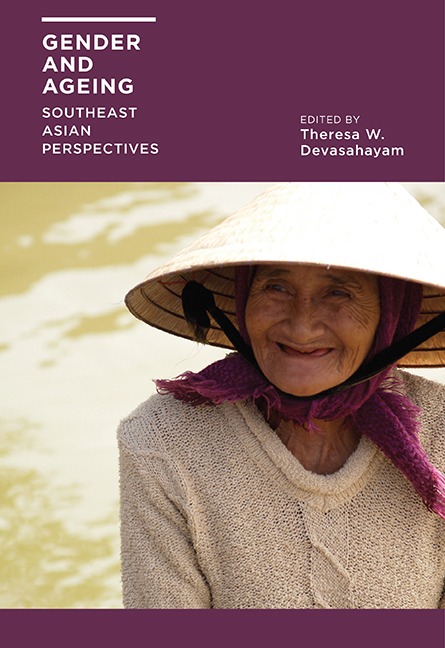Book contents
- Frontmatter
- Contents
- List of Tables and Figures
- Acknowledgments
- Contributors
- 1 Growing Old in Southeast Asia: What Do We Know about Gender?
- 2 Gender and Ageing in Thailand: A Situation Analysis of Older Women and Men
- 3 Gender and Well-being of Older Persons in Cambodia
- 4 Preparations for Old Age and Social Participation of Present and Future Older Persons in Thailand: Gender Difference
- 5 Gender and Health Status among Older Adults in Vietnam
- 6 Ageing and Gender Preferences in Rural Indonesia
- 7 Exploring the Experiences of Older Men and Women in Caregiving and Care-receiving in Sarawak, Malaysia
- 8 An “Active Ageing” Approach to Living Alone: Older Men and Women Living in Rental Flats in Singapore
- 9 Ethnic Patterns and Styles of Active Ageing among Widows and Widowers in Singapore
- 10 Employment Patterns of Older Women in Indonesia
- 11 Gender Differentials in Work and Income among Older Malaysians
- 12 Gender and Economic Well-being among Older Filipinos
- 13 Work, Retirement and the Gender Divide in the Philippines
- Index
13 - Work, Retirement and the Gender Divide in the Philippines
Published online by Cambridge University Press: 21 October 2015
- Frontmatter
- Contents
- List of Tables and Figures
- Acknowledgments
- Contributors
- 1 Growing Old in Southeast Asia: What Do We Know about Gender?
- 2 Gender and Ageing in Thailand: A Situation Analysis of Older Women and Men
- 3 Gender and Well-being of Older Persons in Cambodia
- 4 Preparations for Old Age and Social Participation of Present and Future Older Persons in Thailand: Gender Difference
- 5 Gender and Health Status among Older Adults in Vietnam
- 6 Ageing and Gender Preferences in Rural Indonesia
- 7 Exploring the Experiences of Older Men and Women in Caregiving and Care-receiving in Sarawak, Malaysia
- 8 An “Active Ageing” Approach to Living Alone: Older Men and Women Living in Rental Flats in Singapore
- 9 Ethnic Patterns and Styles of Active Ageing among Widows and Widowers in Singapore
- 10 Employment Patterns of Older Women in Indonesia
- 11 Gender Differentials in Work and Income among Older Malaysians
- 12 Gender and Economic Well-being among Older Filipinos
- 13 Work, Retirement and the Gender Divide in the Philippines
- Index
Summary
INTRODUCTION
The two most common concerns of nearly all people as they reach the elderly years are their health and their economic security. These concerns are intrinsically interrelated; health problems are generally more common at advanced ages, as is diminished earning capacity resulting from retirement and the cessation of productive activity. Specifically, when health problems increase in old age, the costs incurred in seeking healthcare become a greater concern for an elderly person since the individual would more likely have to rely on savings to meet this need. In developed countries, formal support systems in the form of retirement benefits and pension plans ensure that most people who exit from the labour force in their elderly years are assured of economic sustenance, while health insurance systems take care of much of the financial burden of healthcare. In developing countries like the Philippines, formal support systems are still underdeveloped. As such, the majority of older people still rely on the traditional and informal sources of support provide kin when they themselves are not able to ensure their own economic and health needs (World Bank 1994). One indicator of the lack of an adequate formal support system for older individuals is the higher rate of labour force participation at these ages compared with countries with formal retirement systems (United Nations 2007; United Nations 2002). Typically, in the absence of such a formal system, there is no fixed and mandatory retirement age and people continue economic activity as long as they are physically and mentally able to do so. This period can be fraught with economic uncertainty if failing health threatens the older person's capacity to continue to provide for his/her own needs and that of his/her dependents.
Another common concern is the gender dimension of work and retirement. Much of the literature plays up the potential for unequal vulnerability to adverse economic and health outcomes between men and women.
- Type
- Chapter
- Information
- Gender and AgeingSoutheast Asian Perspectives, pp. 315 - 338Publisher: ISEAS–Yusof Ishak InstitutePrint publication year: 2014



